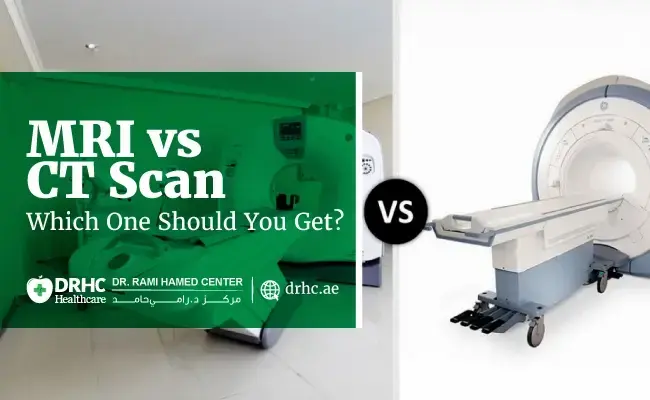
When it comes to pancreatic cancer, early detection can make a life-changing difference. However, this type of cancer is known for being difficult to detect in its early stages, mainly because symptoms are often vague or absent. For many individuals, the question becomes: Can an MRI help catch pancreatic cancer early? At Dr. Rami Hamed Center (DRHC) in Dubai, we understand how worrisome this topic can be, and we’re here to help clarify your options and support you with compassionate, expert care.
Why Is Early Detection of Pancreatic Cancer So Difficult?
Pancreatic cancer often develops silently. In the early stages, symptoms like abdominal discomfort, nausea, or mild back pain can easily be mistaken for less serious conditions. Because the pancreas is located deep within the abdomen, tumors are not easily felt or detected during routine physical exams.
That’s why imaging tests such as MRI scans play a crucial role in identifying potential problems before symptoms worsen.
Can MRI Detect Pancreatic Cancer?
Yes, MRI (Magnetic Resonance Imaging) can help detect pancreatic cancer, especially when combined with other imaging techniques. MRI provides high-resolution images of soft tissues, making it useful for visualizing the pancreas and surrounding organs without radiation exposure.
An MRI can help detect:
- Tumors or masses in the pancreas
- Involvement of nearby blood vessels or lymph nodes
- Whether cancer has spread to other parts of the abdomen
However, MRI alone may not always detect very small tumors or distinguish between cancerous and non-cancerous lesions. In such cases, doctors may recommend additional tests, such as:
- MRCP (Magnetic Resonance Cholangiopancreatography): A special type of MRI that focuses on the bile ducts and pancreatic duct
- CT scan or Endoscopic Ultrasound (EUS): Often used in combination with MRI for more detailed evaluation
- Tumor marker blood tests (e.g., CA 19-9)
Who Should Consider an MRI for Pancreatic Screening?
Although routine screening for pancreatic cancer isn’t recommended for the general population, an MRI may be advised for people with higher risk factors, including:
- A family history of pancreatic cancer
- Known genetic syndromes (such as BRCA mutations)
- Chronic pancreatitis
- New-onset diabetes after age 50 with no other explanation
If you fall into any of these categories or are experiencing persistent, unexplained symptoms, it’s important to consult with a specialist. At DRHC Dubai, our experienced team can guide you through a safe and tailored diagnostic plan.
What to Expect During an MRI Scan
We understand that medical imaging can feel intimidating, especially when cancer is a concern. Here’s what you can expect:
- Non-invasive and painless: You’ll lie on a table that slides into a scanner. No incisions or needles are involved unless a contrast dye is used.
- No radiation: Unlike CT scans or X-rays, MRI uses magnetic fields, making it a safer choice for repeated imaging when necessary.
- Time commitment: The scan typically takes between 30 and 60 minutes.
- Comfort and safety: At DRHC Dubai, we use advanced MRI equipment designed to reduce noise and improve patient comfort. Our radiology team ensures a calm, professional environment every step of the way.
Is MRI Better Than a CT Scan for Pancreatic Cancer?
Both MRI and CT scans are valuable tools for evaluating the pancreas. CT scans are often the first-line imaging choice due to their speed and high accuracy in detecting pancreatic tumors. However, MRI may be preferred in certain cases:
- When a patient cannot be exposed to radiation
- When clearer soft tissue detail is needed
- For evaluating cystic lesions or bile duct involvement
Often, a combination of both imaging types gives the clearest picture and helps ensure the most accurate diagnosis.
Explore Our Related Blogs
- MRV Brain Scan Explained: Symptoms That Shouldn’t Be Ignored
- Signs You Might Have a Brain Aneurysm – And Why MRA Can Help
- Can Brain MRI Detect Early Alzheimer’s or Dementia?
- Breast MRI or Mammogram – Which Is Better for You?
Frequently Asked Questions (FAQs)
1. Does an MRI show pancreatic cancer better than ultrasound?
MRI provides much more detailed imaging than abdominal ultrasound, especially for deep structures like the pancreas. While ultrasound may be used initially, MRI or CT is generally preferred when a more accurate view is needed.
2. Is MRI safe for everyone?
Yes, MRI is generally very safe and does not use radiation. However, patients with certain metal implants or pacemakers may need alternative imaging. Our team at DRHC Dubai will review your medical history before the procedure to ensure your safety.
3. Will I need contrast dye during the MRI?
In some cases, a contrast agent (gadolinium) may be used to enhance the clarity of the images. It is typically well-tolerated, and we take special care if you have any history of allergies or kidney issues.
4. What are the symptoms that might suggest I need an MRI of the pancreas?
If you are experiencing unexplained upper abdominal pain, yellowing of the eyes or skin (jaundice), weight loss, back pain, or new-onset diabetes, it’s worth consulting a doctor. Imaging may be recommended depending on your symptoms and risk profile.
5. How can I schedule an MRI or consultation at DRHC Dubai?
You can contact the Dr. Rami Hamed Center (DRHC) through our website or by calling our appointment line. Our team is ready to assist you with timely, compassionate, and expert care in a modern and comfortable environment.
Final Thoughts: Don't Ignore Unexplained Symptoms
While MRI is a powerful tool in detecting pancreatic cancer, it works best as part of a comprehensive diagnostic approach. If you're experiencing unusual symptoms or have risk factors, getting a timely evaluation can make all the difference.
At DRHC Dubai, we offer advanced MRI services, expert consultation, and coordinated care—all under one roof. Let us help you take the next step toward clarity and peace of mind.
Book your consultation today—early answers matter.
📞 +971 4 279 8800
🌐 www.drhc.ae
📍 Dubai Healthcare City, Building 52









Leave a comment